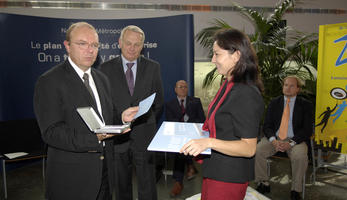Creating 246 company travel plans
Thematic areas
Behavioural change & mobility management
Summary
In response to the congestion and emissions problems caused by commuting in Nantes, company travel plans were promoted to encourage employees to opt for more sustainable transport modes.
Implementing sustainable mobility
In 2002, prior to measure implementation, 75 percent of the almost 600,000 work-related trips in the Nantes conurbation were made by car, largely in peak hours. Increasing levels of congestion, and the resulting deterioration in air quality, highlighted the need to address the situation.
It was demonstrated that only a small decrease in car traffic would be sufficient to improve traffic flow, lower fuel consumption and reduce emissions of pollutants. Company travel plans were therefore seen as a good way to tackle the problem, especially among the growing number of employees concerned about climate change issues and the rising price of fuel.
The city of Nantes introduced travel planning for its own employees with the aim of increasing public transport use from 20 to 30 percent and reducing the modal share of private cars from 62 to 50 percent for commuting and work-related trips. Nantes worked in partnership with the public transport operator SEMITAN, the national environmental agency ADEME, the chamber of commerce and various local companies.
The benefits of the travel plans:
- For the company — improved accessibility for clients and visitors and reduced parking demand.
- For employees — cost savings, less stress, better health, more available solutions for employees who do not own a car.
- For the local authority — less congestion, less pollution, economic savings and enhanced road safety.
Progress
Support provided to companies included technical and financial help in elaborating the mobility plans and a discount on public transport season tickets for employees.
The company travel plans were implemented in four stages:
- An analysis of employees’ mobility needs and habits, and of the company’s accessibility by various transport modes.
- Elaboration of concrete measures with provision of better information on alternative modes.
- The signing of a contract between the company, Nantes Metropole and SEMITAN.
- Regular follow-up with an assessment after three years of implementation, comparing mobility habits with the objectives stated in the contract.
Outcomes
By the end of 2010, a total of 246 company travel plans had been put into effect (compared to 16 in 2005), benefiting around 66,690 employees.
By way of illustration, the company travel plan of the Nantes local authority (2,300 agents) reduced car use from 62 percent to 50 percent, representing an annual saving of 640,000 km and a decrease in CO2 emissions by 90 tonnes.








